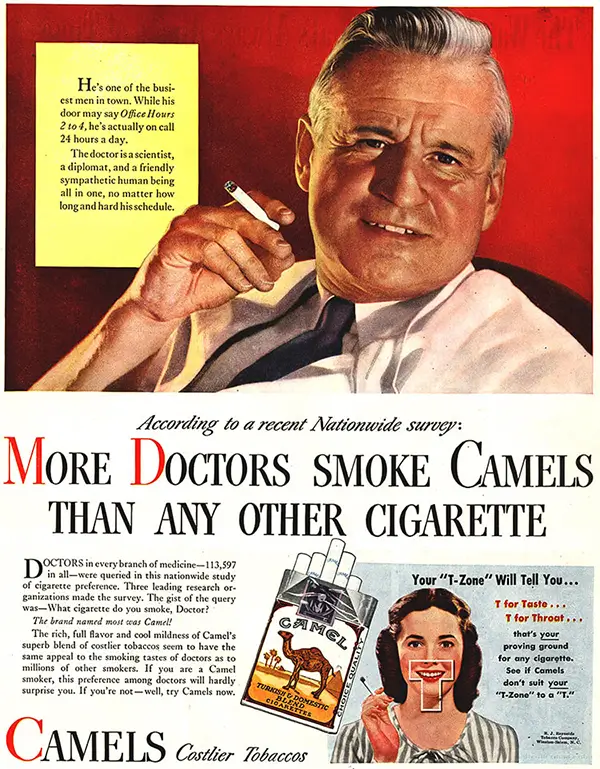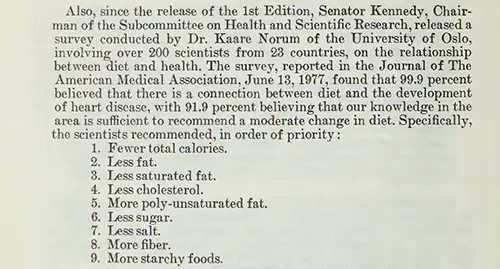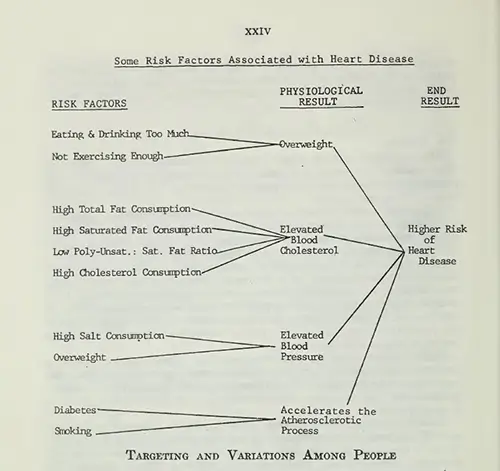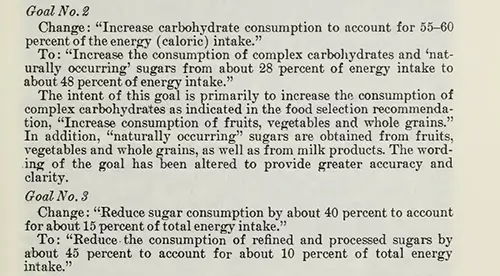El Informe McGovern - Intereses especiales y supresión de la ciencia
En 1977 el empuje para un cambio de Pautas Dietéticas (McGovern Informe) a más a base de plantas vegana uno se había introducido en el Congreso de los estados UNIDOS.
Milos Pokimica
Escrito por: Milos Pokimica
Revisado Médicamente Por: Dr. Xiùying Wáng, M.D.
Actualizado el 9 de junio de 2023La batalla por las vidas humanas, el control y los beneficios es real, pero se libra entre bastidores.
Lo que la mayoría de la gente conoce no es más que propaganda. Los médicos son buenos, tienen que prometer un juramento hipocrático, están ahí para curarte y ayudarte, y por supuesto un día la medicina nos va a librar de todas las enfermedades. En realidad, es todo lo contrario y a veces se te echa en cara que es patética.
Para la mayoría de las personas que no están familiarizadas con la historia de la ciencia de la nutrición, puede resultar sorprendente que el propio gobierno tenga una red para suprimir la ciencia y que el interés individual de los hombres no sea su principal objetivo. Basta recordar ejemplos como el "Informe McGovern".
En 1977 se publicó el "Informe McGovern". George McGovern fue un antiguo senador demócrata por Dakota del Sur que en 1972 sufrió una derrota presidencial ante Richard Nixon, pero también estuvo al frente del comité que dio a conocer las primeras Guías Alimentarias en Estados Unidos. Antes de eso, era como ahora. Carne y azúcar.
En 1977, la mayor parte de la ciencia a la que se hace referencia en los artículos de GoVeganWay era conocida hasta cierto punto. Incluso antes. Las enfermedades de la opulencia como las cardiopatías o el cáncer empezaban a dispararse incluso a principios del siglo XX en EE.UU. y algunos otros países desarrollados. El consumo de carne aumentó porque aumentó la riqueza personal y la gente empezó a gastar más en comida. Esto ocurrirá en todas partes donde suba el nivel de vida. Por ejemplo, en las zonas rurales de China e India, la gente vive principalmente con una dieta vegana basada en el almidón y dominada por el arroz, debido a la pobreza. Pero cuando esas personas se trasladen a las ciudades para trabajar en alguna fábrica de nueva construcción, tendrán más dinero para gastar en comida, y eso es exactamente lo que ha ocurrido en Estados Unidos.
Como consecuencia, las enfermedades de la opulencia se dispararon. Después de la Segunda Guerra Mundial, la nutrición, como ciencia, empezó a investigarse de forma más profesional y científica. Se había investigado y se tardó un par de décadas, pero se había llegado a un consenso científico.
El consenso era que no se trataba sólo de grasa animal saturada, como se creía en los años cincuenta, o no era sólo colesterol, sino de una dieta antinatural dominada por productos animales en su conjunto. Ese tipo de dieta era diferente de la dieta vegana basada en almidón que la gente comía hace apenas cien años. El consenso científico en ese momento era y esto es en la década de 1970 que los seres humanos como especie son primates y no verdaderos omnívoros anatómicos. El consenso era que el gobierno -respaldado por toda la investigación nutricional- debía cambiar su modelo de pirámide alimentaria dominada por los productos animales y que Directrices dietéticas debería estar más en consonancia con la evolución humana. Se hizo el informe, pero incluso ese informe tuvo que ser "suavizado", pero aún así. Se impulsó el cambio de las Guías Alimentarias aceptadas y se presentó al Congreso.
Era el Informe McGovern.
¿Qué tenía de malvado este informe? Básicamente afirmaba que deberíamos comer más cereales integrales, más fruta, más verdura, menos carne, menos lácteos, al menos menos menos lácteos integrales, azúcar, etcétera. Seguía siendo una forma de compromiso y no abogaba por una dieta totalmente vegana, pero era un paso en una dirección similar. Se esperaba que estas nuevas directrices sobre alimentación tuvieran efectos similares a los del Informe del Cirujano General de 1964 sobre el tabaquismo.
Esta es una cita del propio informe:
"Hay muchas pruebas, y siguen acumulándose, que implican fuertemente y, en algunos casos, demuestran que las principales causas de muerte y discapacidad en Estados Unidos están relacionadas con la dieta que seguimos. Yo (el Dr. Hegsted, de la Escuela de Salud Pública de Harvard) incluyo la enfermedad arterial coronaria, responsable de casi la mitad de las muertes en Estados Unidos, varias de las formas más importantes de cáncer, la hipertensión, la diabetes y la obesidad, así como otras enfermedades crónicas."
La industria y una gran parte de los senadores calificaron el informe de gran teoría de la conspiración y que el Comité McGovern cree en privar a la gente de lo que le gusta.
Esto se extrajo de un acta oficial de la audiencia del comité, y más tarde se difundió la misma historia en los principales medios de comunicación. Si usted no cree en las teorías de la conspiración y ver los principales medios de comunicación aquí es un ejemplo de la mentalidad de la gente de la industria.
En aquel momento, el instituto The Salt advirtió que:
"Si la gente comiera más sano, tendríamos más ancianos a los que cuidar"..., "aumentando simultáneamente el coste del cuidado de los ancianos, que entra en la categoría de gastos sanitarios".
A los "gobernantes" no les gustan los viejos porque no producen y sólo chupan los recursos que los gobernantes quieren para ellos. Es mejor para ellos y para la economía que la gente muera a los 60 justo antes de jubilarse, y es aún mejor que gasten todos sus ahorros en operaciones de corazón y quimioterapia antes de morir. No sería rentable para los "gobernantes" tener masas de gente viviendo regularmente hasta los 90 años. Este planeta, en su mentalidad, ya está superpoblado.
Las demás industrias también se volvieron locas, especialmente la de la carne y los huevos.
Advierten de que:
"Si las Metas Dietéticas son segadas hacia adelante y promovidas como una norma presente los sectores enteros de la industria alimentaria -la carne, los lácteos, el azúcar y otros pueden estar tan gravemente dañados que cuando se compruebe que los Objetivos Dietéticos son desacertados, como seguramente se descubrirá, la recuperación de la producción puede estar fuera de nuestro alcance."
Sin embargo, la industria alimentaria no detuvo este informe. Este informe fue finalmente detenido al más alto nivel político. El nivel que ve a las personas como un recurso.
El informe completo, en pdf: (descargar)
Referencias:
Pasajes seleccionados de un libro: Pokimica, Milos. ¿Te haces vegano? Revisión de la Ciencia Parte 2. Kindle ed., Amazon, 2018.
- “Dieta relacionada con enfermedades mortales, III : Audiencias ante el Comité Selecto de Nutrición y Necesidades Humanas del Senado de los Estados Unidos, Nonagésimo Quinto Congreso, ..." HathiTrust, babel.hathitrust.org/cgi/pt?id=uc1.a0000416073;view=1up;seq=1.
- Oppenheimer GM, Benrubi ID. McGovern's Senate Select Committee on Nutrition and Human Needs versus the meat industry on the diet-heart question (1976-1977). Am J Public Health. 2014 Jan;104(1):59-69. doi: 10.2105/AJPH.2013.301464. Epub 2013 Nov 14. PMID: 24228658; PMCID: PMC3910043.
Contenidos Relacionados
¿Tienes alguna duda acerca de la nutrición y la salud?
Me encantaría saber de usted y responderlas en mi próxima publicación. Agradezco sus aportes y opiniones y espero tener noticias suyas pronto. También te invito a síguenos en Facebook, Instagram y Pinterest para más contenidos sobre dieta, nutrición y salud. Puedes dejar un comentario allí y conectar con otros entusiastas de la salud, compartir tus consejos y experiencias, y recibir apoyo y ánimo de nuestro equipo y nuestra comunidad.
Espero que este post le haya resultado informativo y ameno y que esté preparado para aplicar los conocimientos adquiridos. Si le ha resultado útil, por favor compártelo con tus amigos y familiares que también podrían beneficiarse de ella. Nunca se sabe quién puede necesitar orientación y apoyo en su camino hacia la salud.
– También Te Puede Interesar –

Aprenda Sobre Nutricion
Milos Pokimica es doctor en medicina natural, nutricionista clínico, escritor sobre salud médica y nutrición y asesor en ciencias de la nutrición. Autor de la serie de libros Go Vegan? Revisión de la Ciencia, también dirige el sitio web sobre salud natural GoVeganWay.com.
Descargo De Responsabilidad Médica
GoVeganWay.com le ofrece reseñas de las últimas investigaciones relacionadas con la nutrición y la salud. La información proporcionada representa la opinión personal del autor y no pretende ni implica sustituir el asesoramiento, diagnóstico o tratamiento médico profesional. La información proporcionada tiene fines informativos únicamente y no pretende sustituir la consulta, el diagnóstico y/o el tratamiento médico de un médico o proveedor de atención médica calificado.NUNCA ignore el CONSEJO MÉDICO PROFESIONAL O RETRASAR la BÚSQUEDA de TRATAMIENTO MÉDICO a CAUSA DE ALGO QUE HAYA LEÍDO EN O accesibles a TRAVÉS de GoVeganWay.com
NUNCA APLICAR CUALQUIER cambio de ESTILO de vida O CAMBIOS EN su totalidad COMO UNA CONSECUENCIA DE ALGO QUE HA LEÍDO EN GoVeganWay.com ANTES de CONSULTAR con LICENCIA PROFESIONAL MÉDICO.
En el caso de una emergencia médica, llame a un médico o al 911 inmediatamente. GoVeganWay.com no se recomienda ni aprueba ninguna de los grupos, las organizaciones, las pruebas, los médicos, productos, procedimientos, opiniones u otra información que pueda ser mencionado en el interior.
Selecciones del editor –
Milos Pokimica es escritor especializado en salud y nutrición y asesor en ciencias nutricionales. Autor de la serie de libros Go Vegan? Revisión de la Ciencia, también dirige el sitio web sobre salud natural GoVeganWay.com.
Últimos artículos -
Top Noticias De Salud — ScienceDaily
- The overlooked nutrition risk of Ozempic and Wegovyen febrero 4, 2026
Popular weight-loss drugs like Ozempic and Wegovy can dramatically curb appetite, but experts warn many users are flying blind when it comes to nutrition. New research suggests people taking these medications may not be getting enough guidance on protein, vitamins, and overall diet quality, increasing the risk of muscle loss and nutrient deficiencies.
- A 25-year study found an unexpected link between cheese and dementiaen febrero 4, 2026
A massive Swedish study tracking nearly 28,000 people for 25 years found an unexpected link between full-fat dairy and brain health. Among adults without a genetic risk for Alzheimer’s, eating more full-fat cheese was associated with a noticeably lower risk of developing the disease, while higher cream intake was tied to reduced dementia risk overall. The findings challenge decades of low-fat dietary advice but come with important caveats.
- MIT’s new brain tool could finally explain consciousnessen febrero 4, 2026
Scientists still don’t know how the brain turns physical activity into thoughts, feelings, and awareness—but a powerful new tool may help crack the mystery. Researchers at MIT are exploring transcranial focused ultrasound, a noninvasive technology that can precisely stimulate deep regions of the brain that were previously off-limits. In a new “roadmap” paper, they explain how this method could finally let scientists test cause-and-effect in consciousness research, not just observe […]
- Why heart disease risk in type 2 diabetes looks different for men and womenen febrero 4, 2026
Scientists are digging into why heart disease risk in type 2 diabetes differs between men and women—and sex hormones may be part of the story. In a large Johns Hopkins study, men with higher testosterone had lower heart disease risk, while rising estradiol levels were linked to higher risk. These hormone effects were not seen in women. The results point toward more personalized approaches to heart disease prevention in diabetes.
- Sound machines might be making your sleep worseen febrero 4, 2026
Sound machines may not be the sleep saviors many believe. Researchers found that pink noise significantly reduced REM sleep, while simple earplugs did a better job protecting deep, restorative sleep from traffic noise. When pink noise was combined with outside noise, sleep quality dropped even further. The results suggest that popular “sleep sounds” could be doing more harm than good—particularly for kids.
- This unexpected plant discovery could change how drugs are madeen febrero 3, 2026
Plants make chemical weapons to protect themselves, and many of these compounds have become vital to human medicine. Researchers found that one powerful plant chemical is produced using a gene that looks surprisingly bacterial. This suggests plants reuse microbial tools to invent new chemistry. The insight could help scientists discover new drugs and produce them more sustainably.
- A hidden cellular process may drive aging and diseaseen febrero 3, 2026
As we age, our cells don’t just wear down—they reorganize. Researchers found that cells actively remodel a key structure called the endoplasmic reticulum, reducing protein-producing regions while preserving fat-related ones. This process, driven by ER-phagy, is tied to lifespan and healthy aging. Because these changes happen early, they could help trigger later disease—or offer a chance to stop it.
PubMed, #Dieta vegana –
- Diet type and the oral microbiomeen febrero 2, 2026
CONCLUSION: The diet-oral microbiome-systemic inflammation axis is bidirectional and clinically relevant. Understanding both direct ecological regulation and indirect metabolic effects is essential to support precision nutrition strategies aimed at maintaining oral microbial balance and systemic inflammatory risk mitigation.
- Consensus document on healthy lifestylesen enero 22, 2026
Proteins are a group of macronutrients that are vital to our lives, as they perform various functions, including structural, defensive and catalytic. An intake of 1.0-1.2 g/kg/body weight per day would be sufficient to meet our needs. Carbohydrate requirements constitute 50 % of the total caloric value and should be obtained mainly in the form of complex carbohydrates. In addition, a daily intake of both soluble and insoluble fiber is necessary. Regular consumption of extra virgin olive oil […]
- Vitamin B12 and D status in long-term vegetarians: Impact of diet duration and subtypes in Beijing, Chinaen enero 21, 2026
CONCLUSIONS: This study reveals a dual challenge among Beijing long-term vegetarians: vitamin B12 deficiency was strongly associated with the degree of exclusion of animal products from the diet (veganism), while vitamin D deficiency was highly prevalent and worsened with longer diet duration. The near-universal vitamin D deficiency observed in this study suggests that, in the Beijing context, the risk may extend beyond dietary choice, potentially reflecting regional environmental factors;…
- Nutritional evaluation of duty meals provided to riot police forces in Germanyen enero 13, 2026
Background: The primary role of the German riot police is maintaining internal security. Due to challenging working conditions, riot police forces face an elevated risk of various diseases. During duty, forces are provided with meals. A balanced diet can reduce the risk of some of these diseases and contribute to health-promoting working conditions. Aim: First evaluation of the nutritional quality of duty meals in Germany based on German Nutrition Society recommendations (DGE). Methods: In…
- Iodineen enero 1, 2006
Iodine is an essential trace nutrient for all infants that is a normal component of breastmilk. Infant requirements are estimated to be 15 mcg/kg daily in full-term infants and 30 mcg/kg daily in preterm infants.[1] Breastmilk iodine concentration correlates well with maternal urinary iodine concentration and may be a useful index of iodine sufficiency in infants under 2 years of age, but there is no clear agreement on a value that indicates iodine sufficiency, and may not correlate with […]
Publicaciones aleatorias –
Publicaciones destacadas -
La última versión desde PubMed, #Dieta basada en plantas –
- From paddy soil to dining table: biological biofortification of rice with zincpor Lei Huang en febrero 4, 2026
One-third of paddy soils are globally deficient in zinc (Zn) and 40% of Zn loss in the procession from brown rice to polished rice, which results in the global issue of hidden hunger, e.g., the micronutrient deficiencies in the rice-based population of developing countries. In the recent decades, biofortification of cereal food crops with Zn has emerged as a promising solution. Herein, we comprehensively reviewed the entire process of Zn in paddy soil to human diet, including the regulatory…
- Molecular Characterization of Tobacco Necrosis Virus A Variants Identified in Sugarbeet Rootspor Alyssa Flobinus en febrero 3, 2026
Sugarbeet provides an important source of sucrose; a stable, environmentally safe, and low-cost staple in the human diet. Viral diseases arising in sugarbeet ultimately impact sugar content, which translates to financial losses for growers. To manage diseases and prevent such losses from occurring, it is essential to characterize viruses responsible for disease. Recently, our laboratory identified a tobacco necrosis virus A variant named Beta vulgaris alphanecrovirus 1 (BvANV-1) in sugarbeet…
- Nutrition in early life interacts with genetic risk to influence preadult behaviour in the Raine Studypor Lars Meinertz Byg en febrero 3, 2026
CONCLUSIONS: Nutrition in early life and psychiatric genetic risk may interact to determine lasting child behaviour. Contrary to our hypothesis, we find dietary benefits in individuals with lower ADHD PGS, necessitating replication. We also highlight the possibility of including genetics in early nutrition intervention trials for causal inference.
- Effect of the gut microbiota on insect reproduction: mechanisms and biotechnological prospectspor Dilawar Abbas en febrero 2, 2026
The insect gut microbiota functions as a multifunctional symbiotic system that plays a central role in host reproduction. Through the production of bioactive metabolites, gut microbes interact with host hormonal pathways, immune signaling, and molecular regulatory networks, thereby shaping reproductive physiology and fitness. This review summarizes recent advances in understanding how gut microbiota regulate insect reproduction. Accumulating evidence demonstrates that microbial metabolites…
- Rationale and design of a parallel randomised trial of a plant-based intensive lifestyle intervention for diabetes remission: The REmission of diabetes using a PlAnt-based weight loss InteRvention…por Brighid McKay en febrero 2, 2026
CONCLUSIONS: This trial will provide high-quality clinical evidence on the use of plant-based ILIs to address the epidemics of obesity and diabetes to inform public health policies and programs in Canada and beyond.
- Diet type and the oral microbiomepor Daniel Betancur en febrero 2, 2026
CONCLUSION: The diet-oral microbiome-systemic inflammation axis is bidirectional and clinically relevant. Understanding both direct ecological regulation and indirect metabolic effects is essential to support precision nutrition strategies aimed at maintaining oral microbial balance and systemic inflammatory risk mitigation.






























